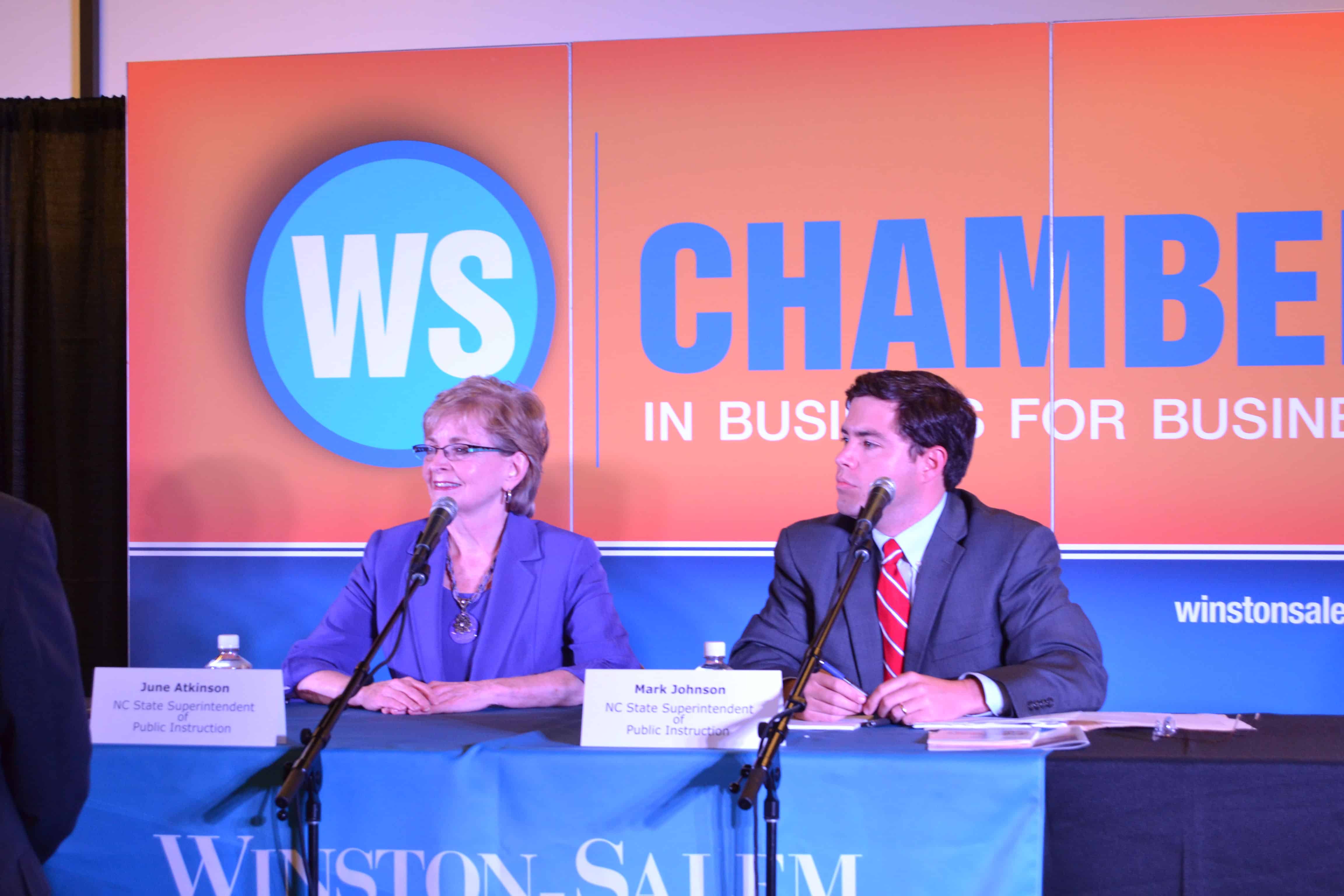Winston-Salem welcomed state superintendent candidates June Atkinson and Mark Johnson September 29 for a debate on their visions for the future of North Carolina education and their solutions to issues like continually low-performing schools, high teacher turnover, and resegregation of the state’s schools.
A question on the candidates’ takes on the Common Core curriculum started the debate, and each had very different responses. Johnson, who is challenging Atkinson’s three-term hold on the office, said he does not support Common Core, and that he often hears complaints from parents as a Winston-Salem/Forsyth County Schools Board of Education member. He said the standards weren’t written or reviewed by educators. Johnson threw the first of many criticisms at Atkinson, saying she promised the state was reviewing the standards for early grades.
“We’ve had these standards for over four years now,” Johnson said. “Why is it taking so long when there are so many students and teachers who are struggling with our standards for the future?”
Atkinson said the standards, under state policy, will be reviewed once every five years. There also needs to be adequate time for professional development, she said, so that teachers can properly adjust to the curriculum changes. Atkinson said the standards were reviewed by teachers of all grades before they were adopted by the State Board of Education.
“We have thousands and thousands of pieces of paper showing feedback,” Atkinson said.
The next question asked Atkinson and Johnson how to get high-quality teachers in the lowest-performing schools. The candidates agreed that higher salary was part of the equation.
Atkinson said teachers should be offered at least $10,000 more to teach at low-preforming schools, and that schools need appropriate resources — like professional development and a great principal to support teachers.
Johnson brought up Cook Elementary, a federal restart school in Winston-Salem, as an example of the kind of testing and curriculum flexibility that’s needed to turn around low-performing schools. These schools are given similar flexibility as charter schools and are one option for continually low-performing schools. Johnson said meaningful professional development and thinking outside of the box is also necessary.
Moderators then asked candidates if enough accountability exists in the voucher and charter school systems.
“If a charter school is not hitting its marks, it needs to be held accountable,” Johnson said. “But make no mistake, charter schools can be a blessing for students.”
Public schools, he said, similarly need urgent action and accountability measures. Johnson talked about West Charlotte High School, where he used to teach. He said higher-achieving students were often not given the attention they deserved because he had to focus on students with the highest needs.
Atkinson, on the other hand, said that charters and traditional public schools have the same level of accountability. “However, when it comes to vouchers and opportunity scholarships,” Atkinson said, “there is no accountability.”
Atkinson said the state-mandated tests used in public schools should be “good enough” for those private schools where students receiving opportunity scholarships attend. If not, she said, all schools should be given the flexibility to use whatever test best suits that school.
The moderators, as a follow-up, asked if the candidates believe that charter schools and opportunity scholarships pose a threat to traditional public education.
“I believe that there are some people in North Carolina who want to get rid of public education and to have it driven by the market,” Atkinson said. She said she’s seen a trend in the legislature of imposing more regulations on traditional public schools and fewer regulations on charter schools and private schools receiving taxpayer money. “That is a recipe for disaster,” Atkinson said.
Johnson said he does not see choice schools as a threat to public education. “Because, most students still go to public schools — traditional public schools. And most students will continue to go to traditional public schools.” He said that other choices can give students a way out of low-performing schools.
The next question was on the “exodus” of North Carolina teachers and how to stop it. Johnson said it takes increased pay and better professional development opportunities. He said he has heard complaints about DPI’s current professional development programs. Atkinson, in a one-minute rebuttal, said feedback has proven that those programs help teachers.
Atkinson said teachers need proper respect, more resources, additional adults in the classroom, and a way to compensate teacher leaders.
Funding was the topic of the next question for the candidates. They were asked if the state’s Republican leaders have genuinely enhanced education spending and support for teachers.
This year, Atkinson said, there has been a rise in per-pupil spending. However, there are still many areas that need more financial support, she said, like textbooks, instructional materials, and teacher assistants in the classroom. “We’ve got a long way to go to catch up to where we have been as far as support for public education,” Atkinson said.
Johnson said it’s clear there’s more work to be done, given that teachers are still having to use their own money to buy classroom materials. He mentioned that digital devices, which have been supported by state leaders, will diminish textbook costs in the future. Johnson also said that funds need to be given to local leaders who know how the money can be best spent in their schools.
Moderators later asked about what methods are needed to protect students from teachers who shouldn’t be in the classroom. Atkinson mentioned a bill she proposed to the General Assembly to mandate statewide fingerprinting as part of the teacher licensure process. The bill didn’t pass. Atkinson said revoking licenses is one of the State Board’s responsibilities — and that she has had to do so over 500 times. The local boards of education, Atkinson said, are also responsible to check teachers’ backgrounds, report problems, and practice responsible hiring methods.
Johnson said he will communicate with and support local school boards in carrying out protective measures in screening and hiring teachers.
When it comes to teacher salaries, the moderators asked next, how much should the state superintendent be held accountable for what the General Assembly does?
Johnson said that on top of the every-day responsibilities of the job, the state superintendent should also act as the bully pulpit for education. If the state superintendent doesn’t agree with the policy coming from the legislature Johnson said, “You should go yell from the rooftop of DPI, ‘This is wrong.'” If elected, Johnson said he would be constantly sharing his experience in schools with legislators and working to influence policy.
Atkinson said, “It is important that the state superintendent use the bully pulpit to move public opinion so that there will be pressure on our General Assembly members to give higher, competitive salaries to teachers.” She said she has spent the last decade working with the General Assembly — and working across the aisle — to put children first.
School bus stop safety was the next topic for debate. Moderators asked what more could be done to stop tragedies from occurring while students enter and leave the school bus.
Atkinson said many important efforts are under way — installing cameras, making sure bus drivers use the correct hand signals, and educating parents, students, and all citizens on the road on the importance of using caution and following laws.
“More of the same is not going to fix these issues,” Johnson rebutted. He said the shortage of bus drivers leads to unsafe environments and rushed bus stops, and that actions to make the job more attractive to potential drivers are needed.
Candidates were also asked what can be said and done to address the ways that integration has failed in our public schools.
Atkinson said the specific measures to make sure diverse schools exist need to be dealt with at a local level — “school district by school district.” She said research shows that segregation has failed and will continue to fail. Wrestling with the problem of resegregation is important to get to a place, Atkinson said, where children are put first in their learning.
Johnson said the answer is “to make all schools great public schools.” For schools in poverty, he said, specific flexibilities and support is often needed. “Equity,” Johnson said, “doesn’t mean giving the same thing to every school or every student.” He said the appropriate resources for each school must be determined to turn around failing schools.
In the candidates’ closing statements, Johnson took his time to touch on over-testing. He said urgency to change the system to be more comprehensive and less reliant on one high-stakes test at the end of the year is needed. The State Board, led by Atkinson, has instituted a proof of concept study to try out new testing procedures. In her closing statements, Atkinson thanked Johnson for summarizing what she said was her view on testing and said she plans on continuing her long fight for giving teachers and students the support they need.
The event was sponsored by the Winston Salem Chamber, the Winston-Salem Journal, Truliant Federal Credit Union, and the Forsyth Education Partnership, and moderated by Winston-Salem Journal editors.
Recommended reading




